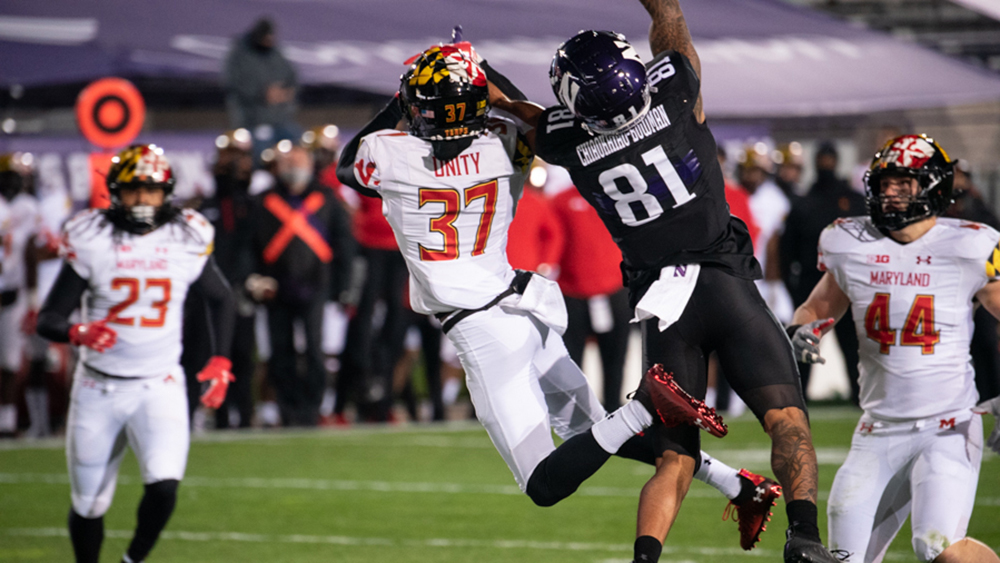Views expressed in opinion columns are the author’s own.
Equality. Unity. Respect. Justice. Empathy. I Got Your Back. Speak Up. One Terp.
All perfectly fine statements. I don’t disagree with them, to be clear. But I do have to ask — does putting them on Maryland football jerseys, helmet stickers and warmup shirts actually amount to a “Bold Statement about Racial Justice,” per the press release from the athletics department?
To put it lightly: No, it doesn’t. Performative at best, dismissive at worst, these bland generalizations and their framing gloss over the racial injustice that is plain to anyone who’s taken even the briefest look at Maryland athletics, the Big Ten and the NCAA, or the sports world as a whole.
To be fair, the student-athletes chose these words and wrote, quite movingly, about what they mean to them. But the fact is, even what the department called “personal statements” weren’t devoid of filtering. Nearly everything student-athletes say is edited quite extensively. They’re never quite free to speak directly to the public or the press. The reason? Money, much like everything about athletics.
I can’t imagine the donors who give to the athletics department and the advertisers who help bring in revenue would be particularly happy if student-athletes could speak freely and openly, unedited and unfiltered — it might cut into their bottom line. What might student-athletes say about … well, really, anything at all?
Take, for example, the ridiculous, exorbitant overfunding of athletic directors’ and coaches’ salaries while players are entitled to exactly nothing in terms of pure financial compensation, with no ability to use their own likenesses or endorsements to earn money and no collective bargaining to even begin to have those discussions, thanks to the NCAA’s strict rules. All this is in the name of “amateurism” and the “student-athlete” — dangerously flawed terms that obfuscate the race-laden history of college football and the “unmistakable whiff of the plantation” that comes with it.
There’s also the fact that Maryland football players — and all Big Ten players right now — are quite literally risking their lives for, surprise, money.
Before the (eventually unanimous) vote to resume, University of Maryland President Darryll Pines said, “If this was all about money, then I would not have supported the Big Ten decision to postpone fall sports.” But it did prove to be all about money, given the profit over prudence motto that this university, like its Big Ten compatriots, is unwilling to ignore. Forcing players to endanger themselves more than ever for a quick buck they’ll never see? That seems problematic on its face.
And, when discussing the frankly shameful decision to resume, another Big Ten president said that “no one wanted this to be political.” But college sports are inherently political.
Their very nature — predominantly white institutions profiting off of predominantly Black athletes who receive very little in return — is political, racialized and monetized. And the hypocrisy here — that such institutions benefit from the facade of social justice and progressivism while remaining fairly rigid in their actual operations — is on full display now more than ever, as athletes are shoved back into play during a global pandemic. That wouldn’t happen in a just, empathetic world.
None of this happens in a vacuum, of course. The entire sports field is rife with similar issues. From the NFL blacklisting of Colin Kaepernick to the NBA’s short-lived strike, the interplay of race and capitalism in sports is undeniable. It’s all about money — about making the big bucks and padding wallets at the bodily expense of those who have historically been denied agency, power and autonomy.
So it’s difficult for me to reconcile the “bold statements” Maryland athletics promised with what we actually got on Saturday night’s abysmal season opener: a few letters on jerseys, a few minutes of commentator intrigue, and that’s all. So much for a real attempt at racial justice.
Serena Saunders, opinion editor, is a public policy graduate student. She can be reached at serena@sersaun.com.



